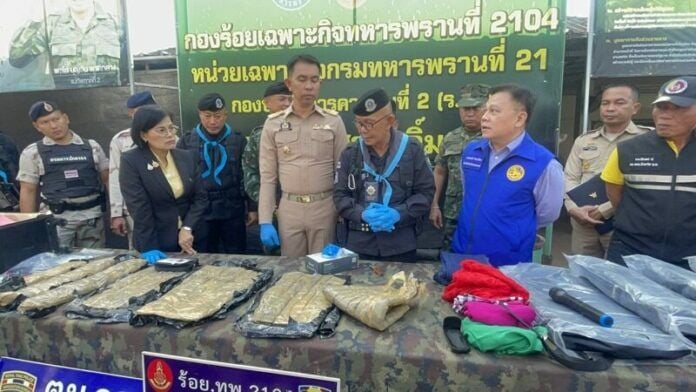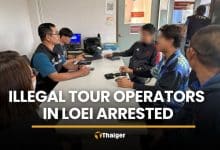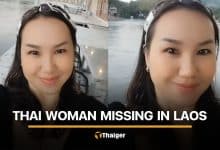Police in Nong Khai thwart major heroin smuggling operation

Police in the northeastern province of Nong Khai successfully intercepted a major drug smuggling operation involving two Thai women and a man from Laos, seizing 10 kilogrammes of heroin. The operation, believed to be preparing for internal distribution and eventual export, was halted yesterday, November 29.
The arrest took place at 3pm at the 2104th Ranger Company. It was led by Pranee Wongbut, Deputy Governor of Nong Khai, along with Chuchat Nontabut, Commander of the 2nd Control Division (Infantry 13) of the Surasak Montri Task Force, and Police Colonel Kasem Mutaporn, Commander of the Nong Khai Provincial Investigation Unit.
Police officers presented the suspects, 30 year old Busaba from Yan Ta Khao district, Trang province; Wilai, a resident of Mueang Pak Ngum in Laos; and Saowalak, along with the confiscated heroin weighing 10.122 kilogrammes.
The operation stemmed from intelligence received by the ranger unit, which indicated an imminent drug smuggling attempt in the Ban Nam Pe area, Rattanawapi district, Nong Khai. In response, officers set up a covert surveillance and inspection team. The team eventually spotted a long-tail boat crossing the Mekong River and docking at the mouth of the Nam Pe Creek. Busaba and Wilai were seen disembarking from the boat, carrying luggage, prompting the officers to conduct a search.
Upon inspection, the officers discovered suspicious white powder concealed within black foam, wrapped in black carbon paper, and further secured with yellow adhesive tape inside the luggage. A field test confirmed the substance as heroin.
Busaba confessed during interrogation that she was hired by Saowalak to retrieve the drugs from a neighbouring country. Saowalak was supposed to return later. Police managed to arrest Saowalak at the Nong Khai bus station as she was returning to the country.

Police suspect that the heroin was intended for distribution within the country or possibly smuggled to a third country. Investigations are ongoing to uncover the larger drug trafficking network involved in this operation.
Drug trafficking remains a persistent issue in the region, with the Mekong River often used as a route for smugglers.
The suspects are now facing legal proceedings as the investigation continues to expand, potentially leading to further arrests and the dismantling of the trafficking network, reported KhaoSod.
What Other Media Are Saying
- Bangkok Post reports the arrest of four drug smugglers in Nong Khai province, highlighting a significant heroin seizure from a house and rubber plantation, emphasising ongoing drug trafficking challenges along the Mekong River. (read more)
- UNODC highlights a joint mission with Thai authorities assessing trafficking along the Laos border, identifying rising drug and human trafficking challenges, and emphasising the need for enhanced cross-border cooperation. (read more)
- Laotian Times highlights ongoing drug smuggling challenges in Laos, with significant recent arrests revealing the scale of the issue despite regional cooperation efforts, underlining an urgent need for enhanced law enforcement strategies. (read more)
Frequently Asked Questions
Here are some common questions asked about this news.
Why is the Mekong River frequently used by smugglers for drug trafficking?
The Mekong River’s extensive border access and remote areas make it a strategic route for illicit activities.
How does intelligence-sharing enhance the fight against drug trafficking in border regions?
Intelligence-sharing fosters collaboration, enabling authorities to anticipate and intercept smuggling operations more effectively.
What if cross-border cooperation was not prioritized in combating drug trafficking?
Lack of cooperation could lead to increased trafficking success, overwhelming local enforcement and endangering regional security.
What role does technology play in modern drug smuggling operations?
Technology aids smugglers with communication, logistics, and concealment, while also helping authorities track and intercept operations.
How can community involvement help in reducing drug trafficking along the Mekong River?
Local communities can provide critical intelligence and support, acting as eyes and ears for police in hard-to-monitor areas.
Latest Thailand News
Follow The Thaiger on Google News:


























